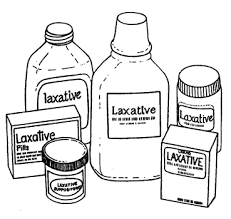Laxatives and Weight Loss

The rate of obesity in the United States is at an all time high. People are searching for the magic pill to make the process of losing weight simple, easy and painless. You may not want to hear this but there is no magic pill. Weight goes ‘on’ the same way it comes off. If you eat more calories than you burn off then its simple- you gain weight. If you eat less than you burn off then you lose weight. Simple. (1)
But while this concept is simple, the practice is not. In this high stress fast-paced world of ours many of us leave out exercise in order to spend time going to the movies with their children or sitting passively on the sidelines watching their children play sports. Grabbing a quick hamburger at the local fast food restaurant has taken over from sit down dinners with vegetables and salad. Do we actually wonder why obesity is at an all time high!
Some of us in desperation turn to laxatives. Let me start by saying -Laxatives and weight loss are not synonymous….read that again. Laxatives and weight loss are also not healthy or safe. The majority of weight that is lost when we use laxatives is from fluid and the health dangers are significant. (2)
The use of laxatives in an attempt to lose weight is often abused and seems to be common with people who have an eating disorder.
So to understand why it is a bad idea to use laxatives Let’s look at what happens in your body when you take them. After the pill is ingested, the active ingredients in the tablet target the cells of the large intestines. They then irritate the cells and encourage the large intestines to empty, often earlier than the body is ready.
One of the main functions of the large intestine is to reabsorb water from the food so that it is not lost from the body as waste. If you evacuate your bowels too soon you run the risk of dehydration.
The calories from the food you eat are absorbed in the small intestines and laxatives don’t affect the small intestines. This means that while the intent behind taking laxatives is to decrease the amount of calories absorbed by the food, the only thing that these medications will do is cause the large intestines to evacuate the waste AFTER the small intestines has extracted all of the necessary calories.
After losing fluid from the early bowel movement the body then compensates by retaining fluid. This means laxatives will cause an initial dehydration which makes the person ‘feel’ thin, but within a few hours the body will compensate by retaining the remaining fluid and consequently making the person ‘feel’ bigger.
The body needs fluid to remove the wastes and toxins in the large intestine so retaining fluids will make you feel bad because you can’t get rid of all of the waste products normally evacuated.
Now at this point you might be tempted to take more laxatives to get rid of the full feeling again and so It’s a vicious cycle that sets you up for irritable bowel syndrome and colon tumors. The Prolonged use of laxatives can lead to cramping, bloating, water retention and the added problem of withdrawal.
Believe me …..the use of laxatives to promote weight loss is just not an option!
All you are doing is endangering your health and definitely won’t be moving toward achieving your goal.
Ok… so how do you stop using laxatives?
You can stop the abuse of laxatives using several steps.
Unless you have been prescribed by a doctor you should stop using laxatives immediately. This can be easier said than done and may require the help of a mental health professional.
Drink at least 6-10 eight oz glasses of water each day. Do Not have caffeine drinks or alcohol or juices, only water. Get some physical activity each day to encourage regular bowel function.
Make sure you Eat regularly and spread it out over at least 3 meals maybe more. Eat lots of fruits and vegetables, which will immediately improve your chances of weight loss and improve normal bowel function. Keep a record every day of your bowel movements so they can be monitored and you can see a pattern. If you find you are constipated for more than 3 days call your doctor – do not treat yourself!
Your colon will react differently than a normal colon after it has been abused by a laxative regimen and of course it depends how long you were on laxatives
Laxatives and weight loss don’t mix. They don’t work. You can stop the vicious cycle and move on to a more healthy and fit way of losing weight for life!
References
(1) Centers for Disease Control: Adult Obesity Facts
http://www.cdc.gov/obesity/data/adult.html
(2) Columbia University Health; Go Ask Alice: Laxative Abuse – Any Side Effects?
http://goaskalice.columbia.edu/laxative-abuse-any-side-effects










